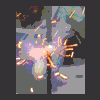I built a star roller from a toy potters wheel with a voltage selection switch to adjust the speed and a large bowl bonded onto it, but never really got good results.
I had far more success rolling stars by hand with a 300mm mixing bowl, and managed to process batches as small as 20g. I'll try and give a brief description but a video may be in order soon:
It is easy but not so environmentally friendly to use lead shot as a core material, and I also found success with tapioca pearls. By far the best I found though were the contents of some desiccant packs - I have no idea what the material is but it looks like clay, and it is very consistent in size, with a rough surface that picks up composition easily.
You'll want to start out with a small (finger actuated) spray bottle, of the type sold to dispense perfumes. A couple of sprays of water/alcohol solution on the core material is usually enough to get them started. As the stars get larger (and your fingers get tired!) you may feel the need to migrate to a larger spray with a trigger, of the type used for antibacterial kitchen spray.
I would also advise you to place a couple of teaspoons of composition in a pepper shaker or similar, to minimise clumping during the early stages of rolling. Then as the stars become reasonable sized you can move to 1/8 teaspoon for a few minutes, then 1/4 teaspoon. As you become familiar with the technique you will find out how much the stars are capable of absorbing between powder/wetting cycles.
Another thing that seems to minimise loss of composition by sticking to the side, is to have separate sides of the bowl for wetting and powder dispensing. It is inevitable that you'll get some stuck to the bowl when dealing with such small amounts, as they don't have the weight to pick it all up.
Keep them moving at all times to prevent sticking, especially during the early stages. If you over-wet you can usually rescue them by dumping an extra increment of powder into the bowl then prize them apart, rolling them without adding any further powder for a couple of minutes afterwards to smooth off any bumps.
You'll discover different motions work for different stars, and some compositions lend themselves to the technique better than others. Metal fuelled and barium nitrate based I find are much easier due to their additional weight, with light and fluffy charcoal based compositions being a real pain to get started.
I have seen videos of people sliding woks around on a carpeted floor, which looks easier on the arms, but you can't get the full range of motions needed, and besides my workshop is not carpeted!
Have fun, and if nothing else it is good exercise standing there waving a bowl around for 30 minutes.
You can never have a long enough fuse...















